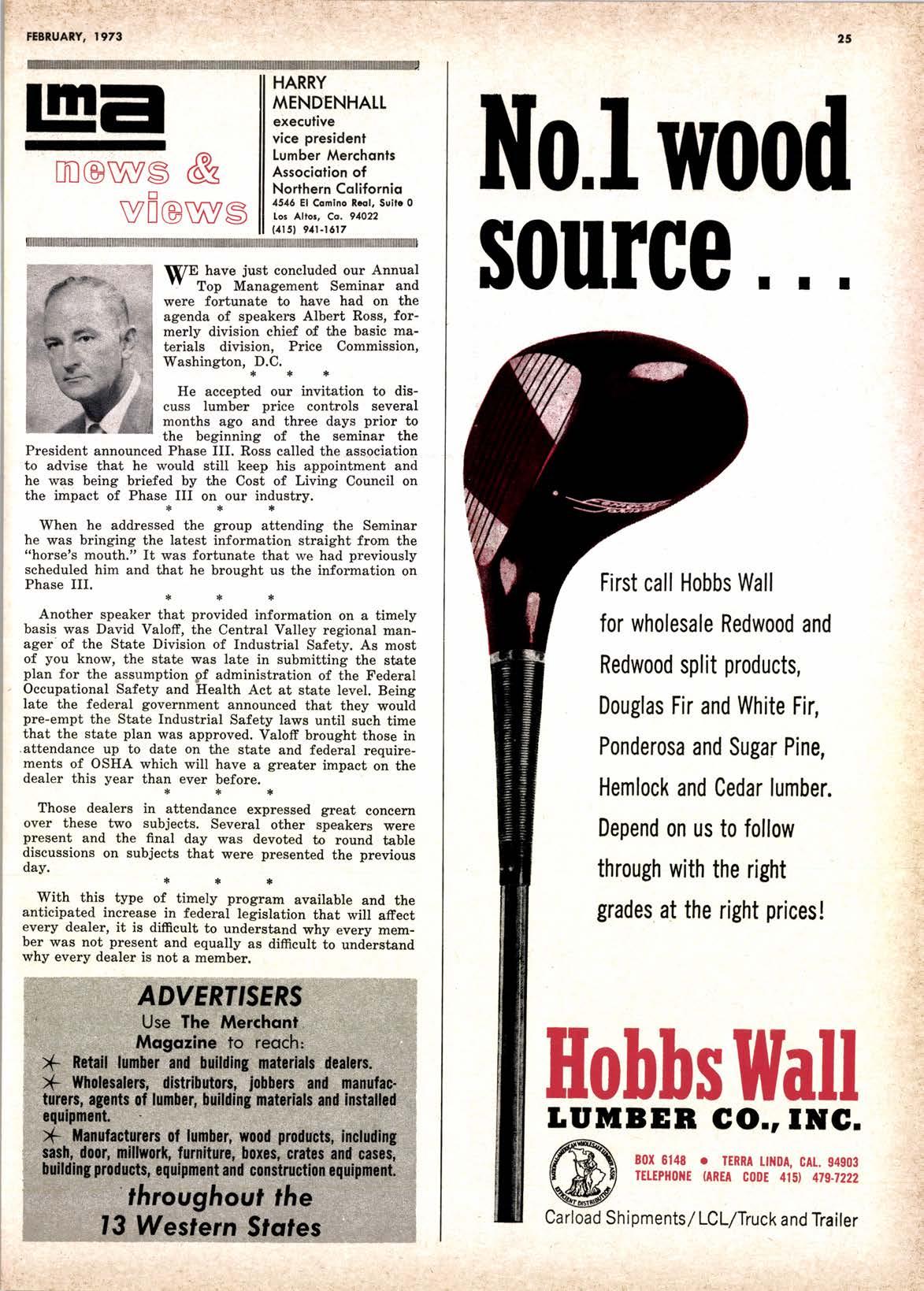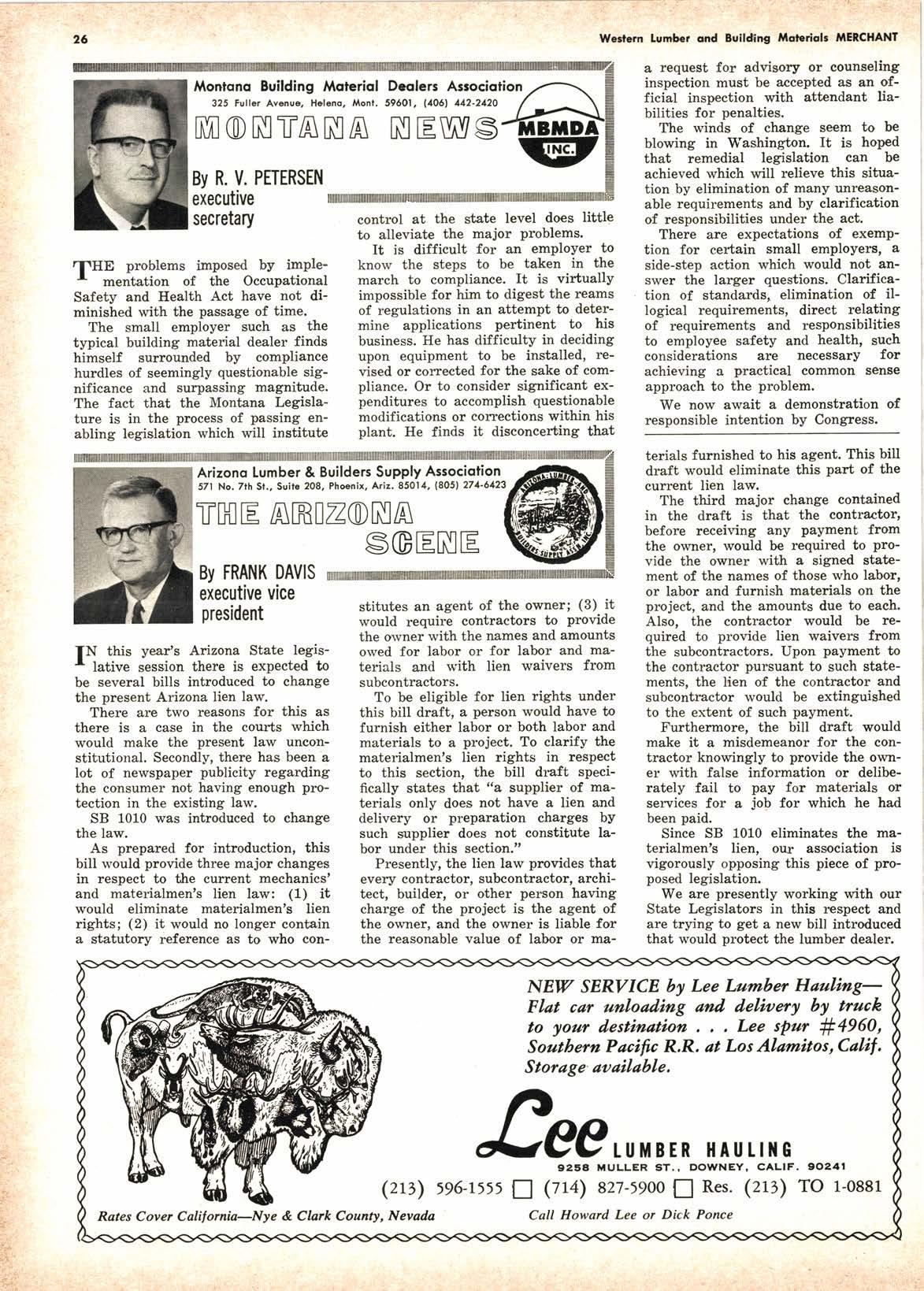
3 minute read
$0urce r. .
First call Hobbs Wall for wholesale Redwood and Redwood split products, Douglas Fir and White Fir, Ponderosa and Sugar Pine, Hemlock and Cedar lumber. Depend on us to follow through with the right grades at the right prices!
By R. V. PETERSEN executive secretary

fHE problems imposed by imPle- ! mentation of the Occupational Safety and Ilealth Act have not dirninished with the passage of time.
The small employer such as the typical building material dealer finds himself surrounded by compliance hurdles of seemingly questionable significance and surpassing magnitude. The fact that the l\fontana Legislature is in the process of passing enabling legislation which will institute control at the state level does little to alleviate the major Problems.
It is difficult for a^n employer to know the steps to be taken in the march to compliance. It is virtually impossible for him to digest the reams of regulations in an attempt to determine applications pertinent to his business. He has difficulty in deciding upon equipment to be installed, revised or corrected for the sake of compliance. Or to consider significant expenditures to accomplish questionable modifications or corrections within his plant. He fin<is it disconcerbing that a request for advisory or counseling inspection must be accepted as an official inspection with attendant liabilities for penalties.
The winds of change seem to be blowing in Washington. It is hoped that remedial legislation can be achieved which will relieve this situation by elimination of many unreasonable requirements and by clarification of responsibilities uader the act
There are expectations of exemPtion for certain small employers, a side-stcp action which would not answer the larger questions. Clarification of standards" elimination of illogical requirements, direct relating of requirements and responsibilities to employee safety and health, such considerations are necessary for achieving a practical common senge approach to the problem.
We now await a demonstration of responsible intention by Congress. terials furnished to his agent. This bill draft would eliminate this part of the current lien law.
By FRANK DAVIS executive vice president
fN this year's Arizona State legis- r lative session there is expected to be several bills introduced to change the present Lrizona lien law.
There are two reasons for this as there is a case in the ccrurts which would make the present law unconstitutional. Secondly, there has been a lot of newspaper publicity regarding the consumer not having enough protection in the existing law'
SB 1010 was introduced to cha,nge the law.
As prepared for introduction, this bill would provide three major changes in respect to the current mechanics' and materialmen's lien law: (1) it would eliminate materialmen's lien rights; (2) it would no longer contain a statutory reference as to who con- stitutes an agent of the owner; (3) it would require contractors to provide the orvner with the names and amounts owed for labor or for labor and materials and v'ith lien waivers from subcontractors.
To be eligible for lien rights under this bill draft, a person would have to furnish either labor or both labor and materials to a project. To clarify the materialmen's lien rights in respect to this section, the bill draft specifically states that "a supplier of materials only does not have a lien and delivery or preparation charges bY such srpplier does not constitute labor under this section."
Presently, the lien law provides that every contractor, subcontractor, architect, builder, or other persion having charge of the project is the agent of the owner, and the owner is liable for the reasonable value of labor or ma-
The third major change contained in the draft is that the contmctor, before receiving any payment fnom the owner, would be required to provide the owner with a signed statement of the names of those who labor, or labor and furnish materials on the project, and the amounts due to each. Also, the contractor would be required to provide lien waivers from the subcontractors. Upon payment to the contractor pursuant to such statements, the lien od the contractor and subcontractor would be extinguished to the extent of such payment.
Furthermore, the bill draft would make it a misdemeanor for the contractor knowingly to provide the owner with false information or deliberately fail to pay for materials or services for a job for which he had been paid.
Since SB 1010 eliminates the materialmen's lien, ow association is vigorously opposing this piece of proposed legislation.
We are presently working with our State Legislators in this respect and are trying to get a new bill introduced that would protect the lumber dealer.










